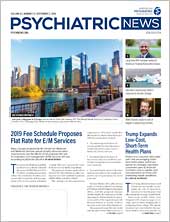A
study published June 8 in
Psychiatric Services in Advance found that providing staff at a clinic with educational briefings coupled with feedback of the clinic’s prescribing trends—academic detailing and auditing—can reduce the number of patients taking multiple antipsychotics concurrently.
Led by investigators at Dartmouth University, this study analyzed prescribing practices at eight community mental health clinics across New Hampshire over a period of two years. Educators who were experienced psychiatrists led academic detailing and audit sessions at the clinics at the start of the study and then again one month, 11 months, and 23 months later.
As lead author Mary Brunette, M.D., described, academic detailing involves educating medical staff about the benefits, risks, and alternatives to medications. Auditing provides the clinic with details about how their prescribing practices compare with others in the state and feedback on how their practice has changed over time.
Using available Medicaid data, Brunette and her team saw that the overall prevalence of polypharmacy among patients who filled prescriptions for antipsychotics dropped a little over 2 percent after the second year of the detailing and auditing intervention from 13.1 percent to 10.9 percent of patients.
The investigators also explored whether the clinics were reducing their use of antipsychotics with a high risk of cardiometabolic side effects such as weight gain and diabetes. They found that while overall prescribing rates of high-risk antipsychotics did not change statistically over two years, there were some positive trends. There was a reduced use of high-risk antipsychotics among Medicaid beneficiaries with psychotic and bipolar disorders, and increased use of low-risk antipsychotics among individuals without hospital or Emergency Department visit—a group considered to be more stable.
“Compared with other studies that have assessed academic detailing for other health practices, our results were right in the middle, which was encouraging,” Brunette said. “It can be difficult for physicians to change medications in people with a serious mental illness, and they do so very cautiously.”
Study co-author Robert Cotes, M.D., an assistant professor of psychiatry at Emory University, agreed. “Two percent doesn’t sound like much, but if you can get this drop across a state or across the country, it can make a big public health difference.”
Brunette added that polypharmacy rates might have dropped even further as time went on and the physicians became more accustomed to new prescribing behaviors. Incorporating additional detailing sessions might also have lowered polypharmacy further, but that also brings about additional cost and time considerations.
“This is an appealing approach to improving health care practice and I hope clinics will consider implementing it,” Brunette said. She acknowledged it might be challenging since many places that see a lot of Medicaid patients have set up contracts with managed care companies. These companies have their own approach to reducing polypharmacy, such as requiring prior authorization to ensure that specific conditions are met before a second antipsychotic will be reimbursed.
Both methods can work, but Brunette feels clinicians would prefer academic detailing and feedback as it gives clinicians more control to use their own judgment; it’s also more engaging. “I’ve found clinicians like the auditing and feedback information,” she said. “They like to see how they compare with their peers.”
She said that she hopes that a future study might directly compare detailing and prior authorization, to get better information on the cost-effectiveness of the two interventions.
Cotes said that he is also interested in attempting a similar study in Atlanta to see how academic detailing might work at a big city hospital that sees thousands of outpatients daily. “These results have given me optimism that changing physician behavior is possible with a low-intensity intervention,” he said.
This study was funded by a grant from the National Institute of Mental Health. ■

